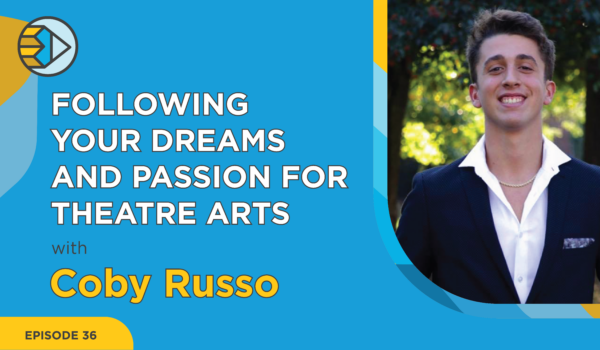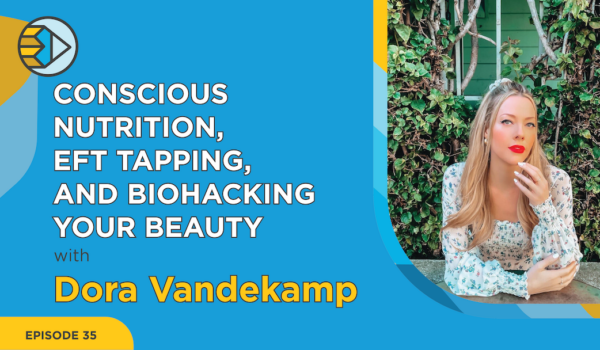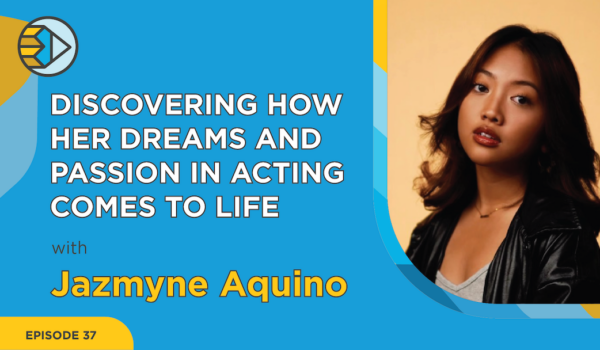
How to Become an Influencer According to Nathalee Pauline
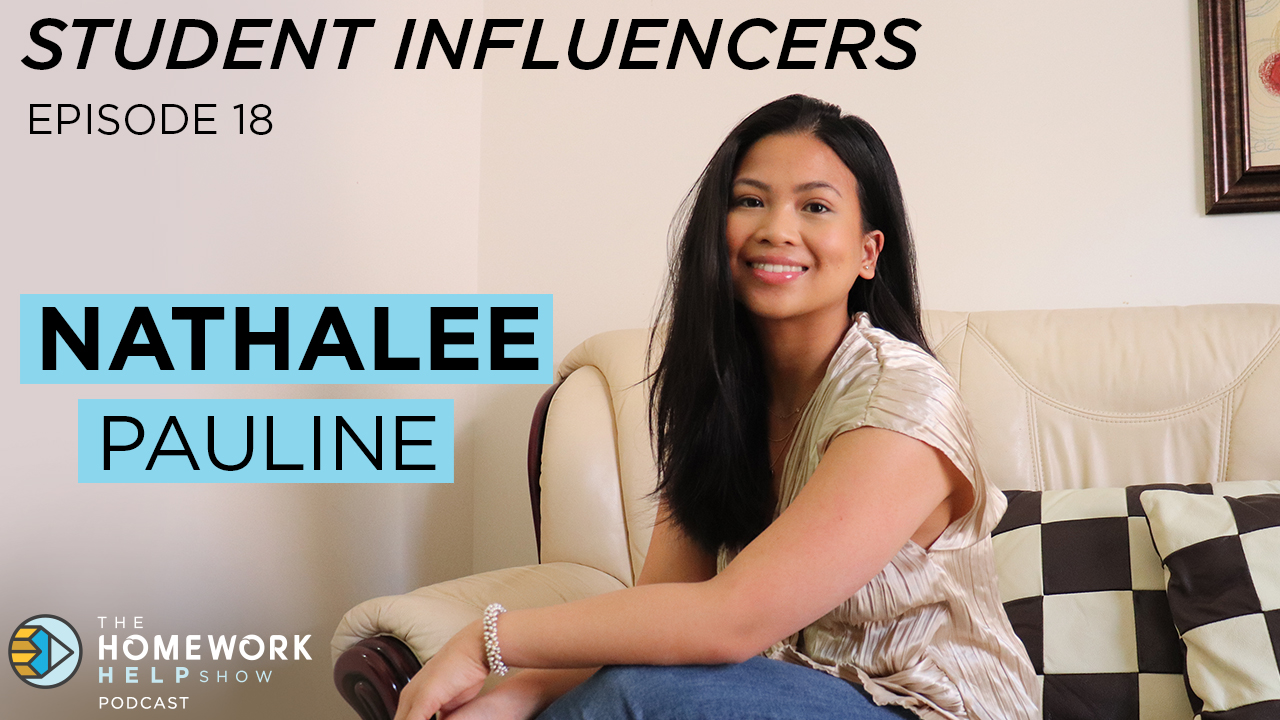 Trying to figure out how to become an influencer as a student? Looking for a side hustle that will help you grow your personal brand while you’re in school? Then you’re going to want to listen to what Nathalee Pauline had to say on the Homework Help Show Student Influencers Podcast.
Trying to figure out how to become an influencer as a student? Looking for a side hustle that will help you grow your personal brand while you’re in school? Then you’re going to want to listen to what Nathalee Pauline had to say on the Homework Help Show Student Influencers Podcast.
Nathalee was born in the Philippines and moved to Markham, Ontario with her family when she was four years old. She recently graduated with a biology degree from the University of Toronto and lives in Ajax, a city just outside of Toronto. When we spoke to her, Nathalee was busy working on building her online brand, including her Instagram page, her blog, and her YouTube channel.
On Episode 18 of the Homework Help Show Student Influencers Series, we caught up with Nathalee while she was in her downtime during the onset of the COVID-19 pandemic. She told us all about how she learned how to become an influencer, shared her best networking tips and advice for making friends at university, and so much more. Get the highlights and insights right here.

From Biology Student to Blogger
In high school, Nathalee loved to dabble in just about everything. She loved the sciences, but she also had a passion for music and the arts. As a kid, she was checking out books about nature from the library and took in all the information she could about the world around her. After considering the most reasonable career path, she decided to pursue a bachelor of science in biology at the University of Toronto.
When Nathalee was in university, her creative side took a hold of her. She was gearing up to do research work in labs and volunteer opportunities to pursue a career in science, but she had a flair for the creative that she couldn’t shake. That urge to learn how to become an influencer was too strong, and she loved that feeling of creating content and putting it out there for the world to see.
Connecting with people through blogging and creating videos gave her a sense of purpose. It didn’t take her long to realize that this was the career she wanted to focus on, so she made a switch: science became her hobby, and her creative hobby became her career.
Ultimately, Nathalee’s goal is to be able to combine her biology knowledge and her passion for the beauty industry into one scalable business. Whether that comes through researching new beauty products or creating a cosmetic line, Nathalee’s on track to do it all.
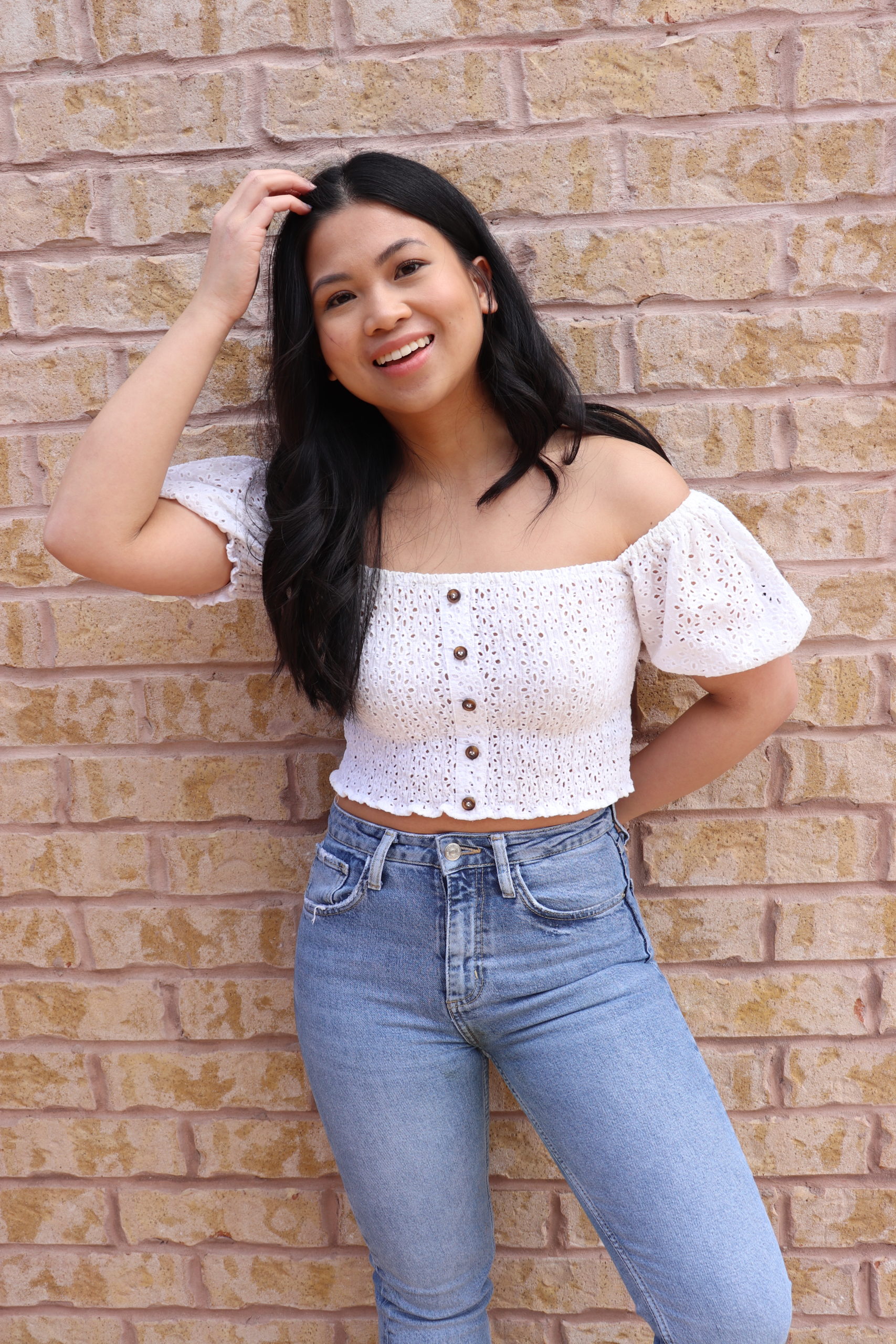
Where it All Began
About three years ago, Nathalee started watching YouTube bloggers in her downtime at school and found a sense of inspiration. She started to fall in love with the blogging sphere and the creative component it offered. Feeling “drenched in bio,” she decided that this would be something that could help her hone in on her creative side while offering a break from the demanding courses she was taking.
With that, Nathalee decided to learn how to become an influencer and forge her own creative path. Her boyfriend was taking programming at school and learning how to build websites, so he got her up and running with a new online home where she could build her brand. She gave him the content she wanted, and he coded it in from scratch.
While they enjoyed working on the project together, Nathalee became vigilant about her brand and started putting in more time and effort. Her boyfriend had to take a step back to focus on school, so she continued on her own and started a brand new website in a new platform. From there, she had a base to keep building up and growing as an influencer.
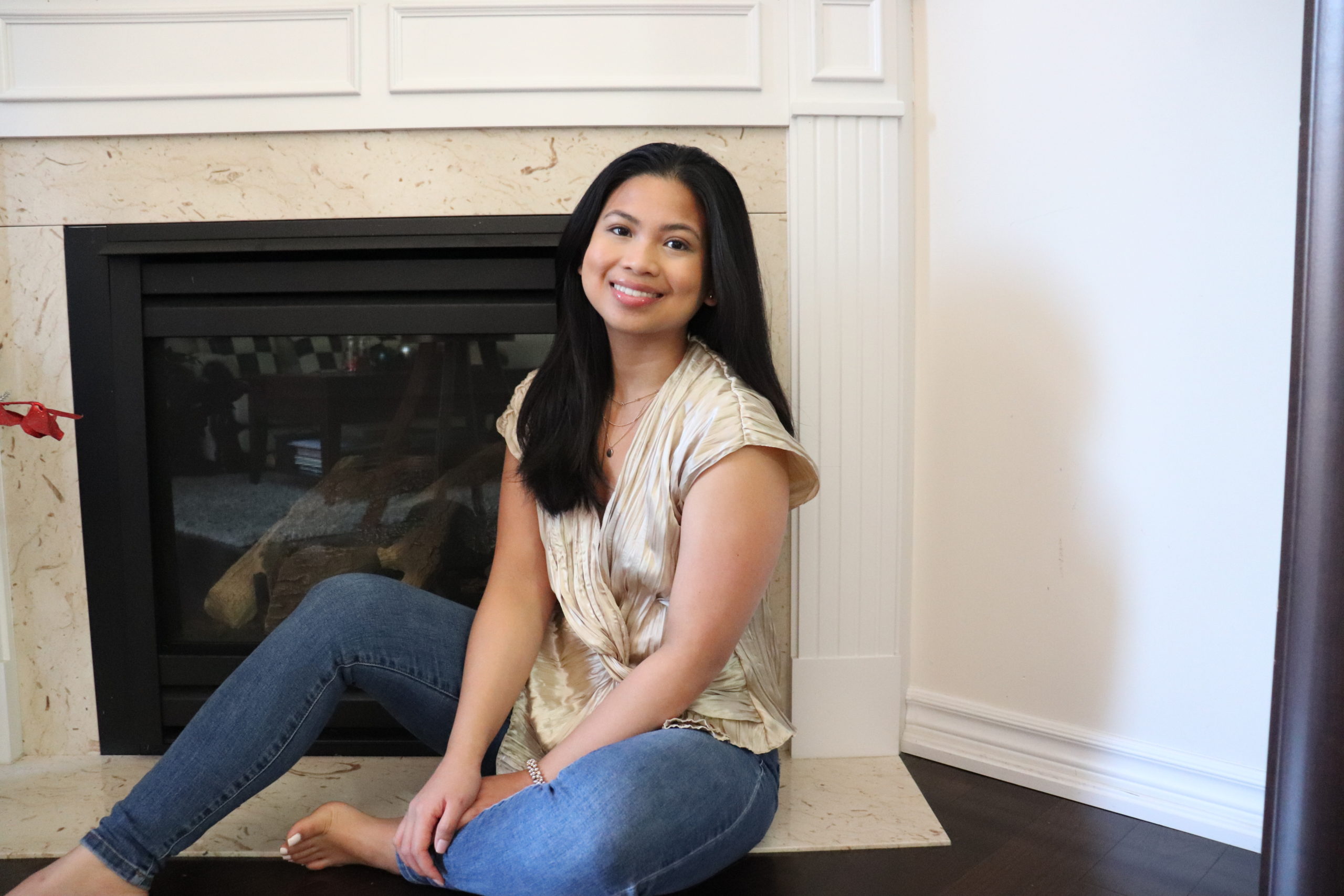
Thinking About Being a Student Influencer? Just Do It!
What’s Nathalee’s biggest piece of advice to anyone who wants to learn how to become an influencer or start their own blog as a student? Just do it!
If you’re thinking about putting yourself out there but you’re nervous about how people will perceive you, that’s completely natural. People on the Internet can be very quick to judge others, but you can’t let the opinions of random Internet users deter you from doing what you’re truly interested in doing.
Nathalee says, “If people are going to judge, it’s because they probably want to do the same thing that you’re doing, but they don’t have enough courage to do it.”
Taking the risk and putting yourself out there is intimidating, but once you start, you’ll be so happy you did. There are always going to be people out there who don’t necessarily agree with what you do, but for everyone who judges you, there will be ten more people who gain value and connection through your content. You will never really know how things are going to turn out if you don’t take that step and get started.
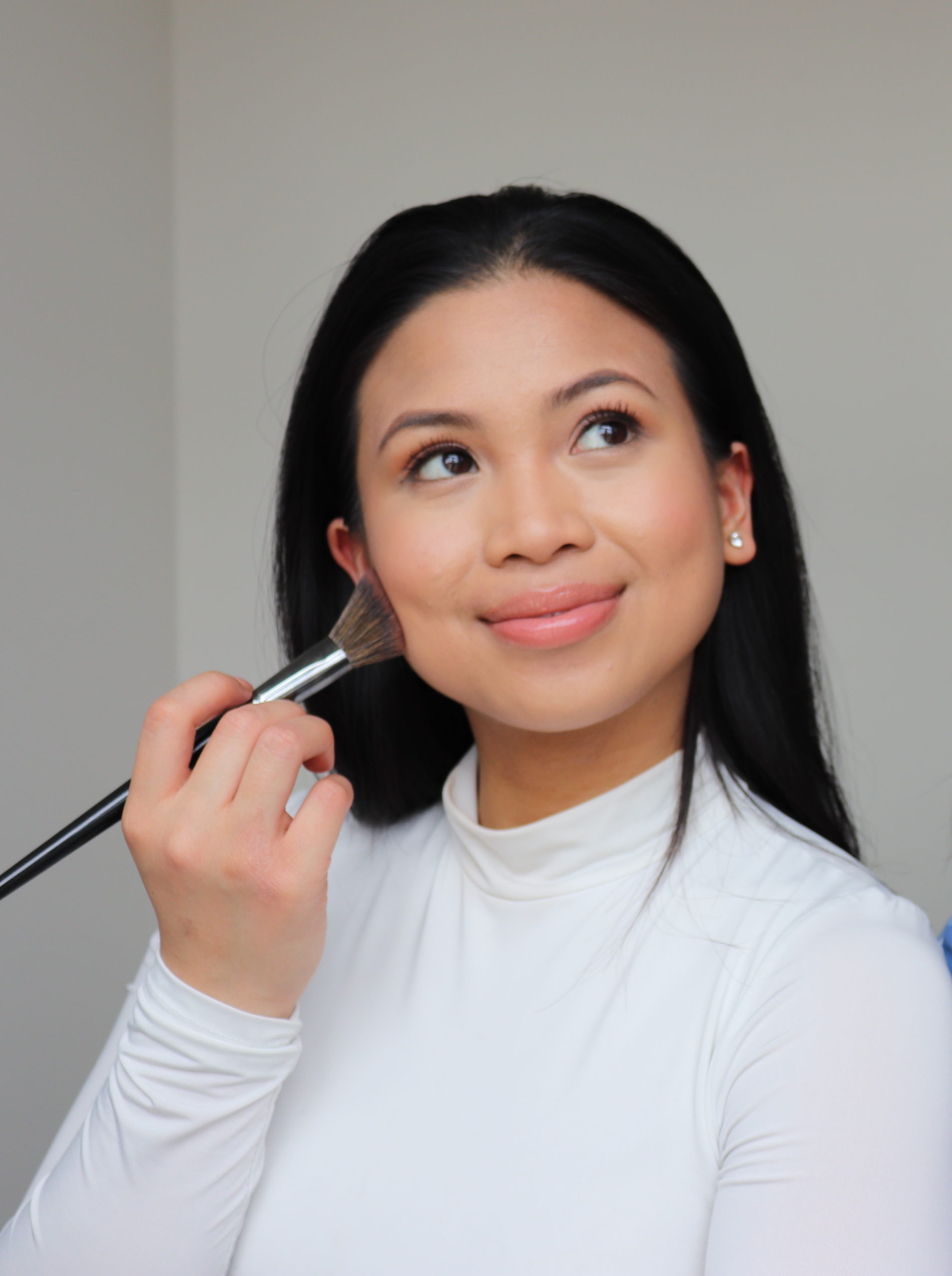
How to Become an Influencer as a Student
Ready to learn how to become an influencer, blogger, or YouTube personality? Here are some of Nathalee’s go-to tips.
● Make a lot of connections. Before you start working with brands and trying to monetize your online persona, you need to build an audience.
● Reach out to other influencers within your industry who have the same size following as you. For example, if you’re a microinfluencer, connect with other microinfluencers within your niche to help each other gain exposure and expand your networks. This will also help you if you start to feel lonely out there in the Internet world.
● Learn how to be yourself. Show your fans and followers the real you and stay authentic to who you are. You will make much more meaningful connections if you share your true self with others.
● Network as much as you can. Ultimately, Nathalee says, “It’s not what you know – it’s who you know.” Connect with other people, learn how to network with others in your niche, and build those relationships from the ground up.
Finding Your Student Side Hustle
If you’re not entirely sold on the idea of being a student influencer, but you are looking for a side hustle during your time in college or university, there are so many options you can try.
Leverage one of your skills or hobbies. Dabbling in amateur photography? Start a part-time photography business or sell your photos to stock photo websites like Shutterstock that will offer you a commission for your work. Love crafting and making things? Open an Esty store and sell your handmade creations.
Offer your tutoring services. If you’re really good in a particular subject, chances are someone out there is struggling and willing to pay for your help. Why not make a little cash by putting your exceptional academic skills to good use? There are likely programs in your school you can try, or you can check online and find an online tutoring website that will help you connect to potential students.
Drive for a food delivery or transportation service. Most students don’t bring their car to school, but if you do have one with you, it’s not a bad idea to drive for Uber or Skip The Dishes on your nights off. The hours are flexible and you can choose when you work, so earn that extra cash on your own schedule.
Need more ideas? Head to our blog, where we share some great side hustle ideas you can do right now as a student.
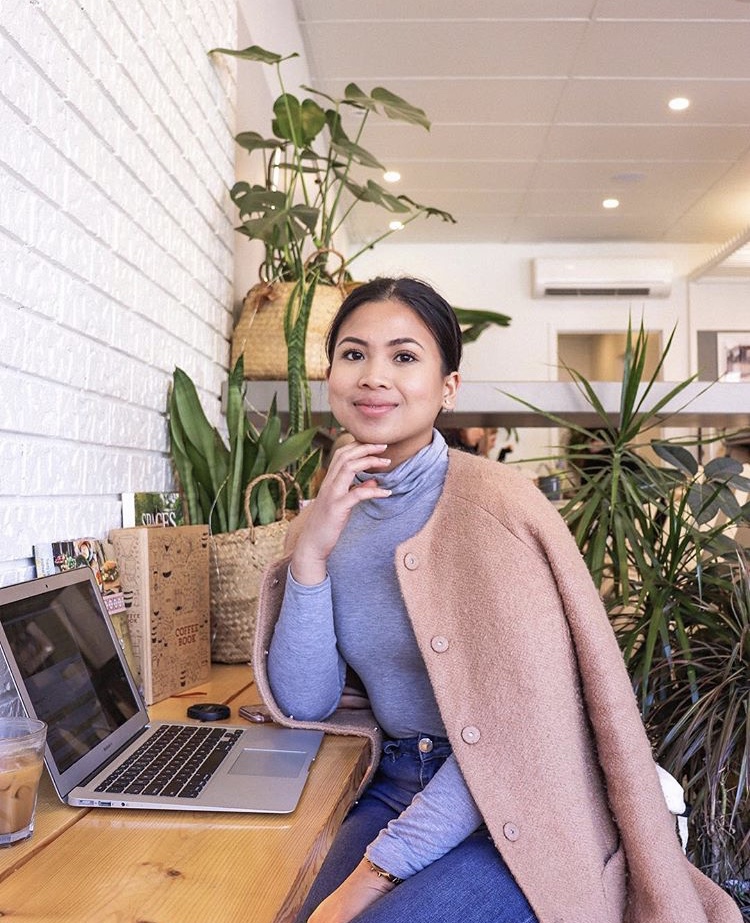
How to Make Friends in University
Humans are social creatures, and having a group that makes you feel like you belong is a major key to keeping your mental health in check. However, making friends at university can be intimidating, especially when you come by yourself to a new city and are starting off on your own.
According to Nathalee, learning how to make friends in university is actually a lot like learning how to become an influencer. It’s about reaching out, making connections, and not being afraid to strike up a conversation with someone new.
Here are some of Nathalee’s best tips on making friends in university.
● Take electives that interest you. One year, Nathalee took a student entrepreneurship class because she was interested in learning how to be her own boss. In that class, she met so many like-minded people who had the same vision and interest because they were all there for the same reasons. This helped her grow her own professional network while making new friends in the process.
● Talk to your classmates. Before and after class, turn around and talk to the people beside, infront, or behind you. Don’t be afraid to introduce yourself to anyone and everyone.
● Connect through shared interests. People in your classes obviously have the same professional and academic interests as you, so use that as common ground. You can also try joining clubs, organizations, and teams to start making friends in university groups that are tailored to people who share your interests.
● Learn how to talk to people. Nathalee’s dad once told her, “If you can’t talk to people, you won’t get anywhere.” This is something she lives by. Practice your social skills often and invest in a conversation with someone. Ask them how they’re doing or what they’re interested in, and keep working on those skills.
If you need more tips on making friends in university, we have some great resources that will help you improve your people skills at school and give you the confidence to get out there and connect.
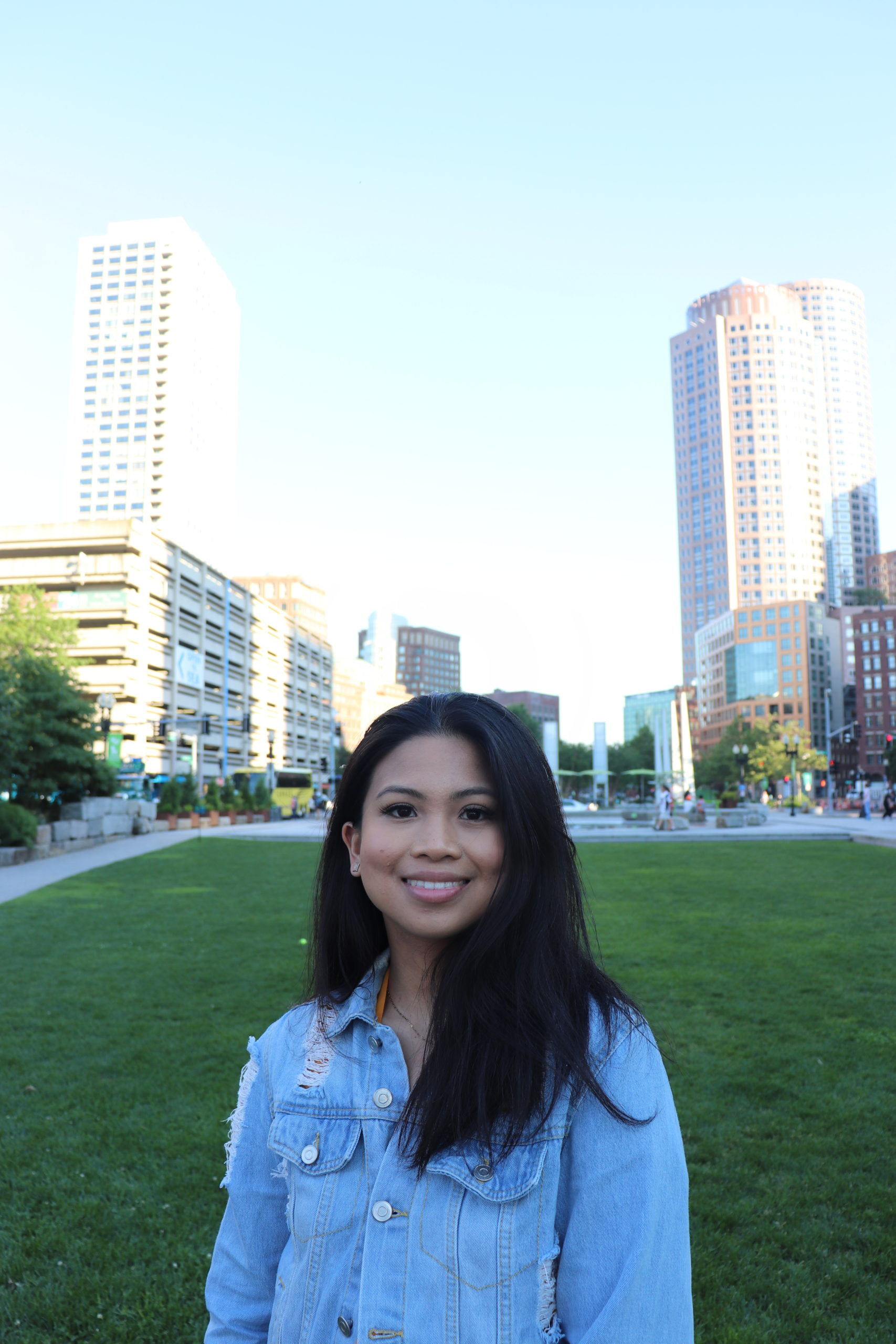
Nathalee’s Secret to Student Success
Throughout her time in school, Nathalee managed to learn how to become an influencer, complete a rigorous biology degree, explore volunteer and research opportunities, maintain her relationship, work part time, and keep up with a social life. Naturally, we wondered what her secret is to managing all of these responsibilities. Her answer? There is no secret!
Nathalee says, “I just did it. There’s no secret. I think it’s all about you just using your calendar, writing down your days, and just doing it.”
For Nathalee, life is about waking up, looking at her list of tasks to do, and then working through it to check them off one by one. The biggest key to making this work was making sure her priorities were in order. School came first. If she had a really big exam coming up, she’d hunker down and spend the majority of her time studying at the library. She’d postone a blog post during the week of a big project if she had to get it done, and then go back to her blog once the schoolwork was over.
When you feel like you’re weighed down from balancing the demands of your life, remember Nathalee’s words: “You have to remember that humans are so, so good at adapting. We’re very good at adapting to challenges. So, you just gotta do what you got to do, and you just got to not complain about it and just be diligent about it. You just gotta do it. There’s really no secret.”
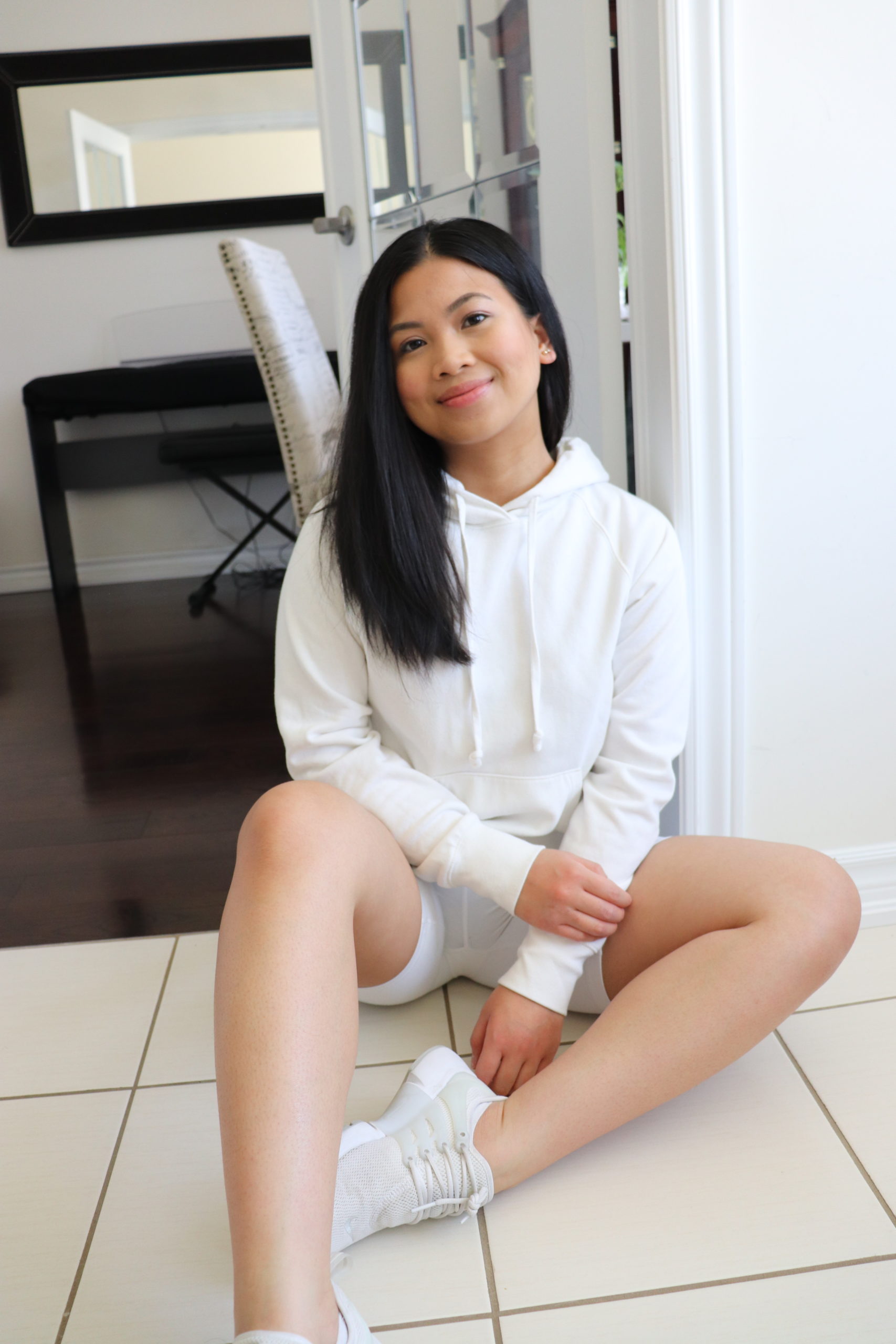
Overcoming Test Anxiety
While she doesn’t really attribute a specific time management routine to her success, Nathalee does acknowledge something she struggled with in her first few years: test anxiety.
At the beginning of university, Nathalee suffered from test anxiety and was not a strong test taker. She would head into an exam with her heart beating so hard she thought it might come out of her chest. Over and over again, she’d start to doubt herself and ask questions like, “What if I didn’t study properly?” or “What if I don’t get everything right?” No matter how prepared she was, she would always feel this anxiety before her tests and exams.
One thing that really helped Nathalee get through her test anxiety and become better at taking tests was reminding herself that there is always another chance. She knew that other people were going through the same experience she was, and that if she failed or did worse than she was hoping, it wouldn’t be the end of the world.
When you’ve studied all you can learn and you’re walking out of that exam, it’s important to remind yourself that you’ve done all you can and you’ve done your best. The more you limit yourself with unattainable or unrealistic expectations, the more unnecessary stress you pile on yourself. Exams are stressful as it is – you don’t need any more seeds of doubt sprouting in your head.
Need more tips on how to manage test anxiety? Check out Episode 38 of the Homework Help Show, where we walk you through building a test preparation ritual that will get you through it.

Lean on Your Support Systems if You Need to
Many universities and colleges offer support systems for students where they can go if they start to feel overwhelmed or burnt out. If you’re lucky, your school might bring in a puppy room with therapy dogs you can go and pet. Other schools have councelling services, free tutoring, academic assistance, extracurricular programs, or even mentorship classes.
Nathalee’s student support system was her friends and family. If she started to feel tired, stressed, or just worn out, she’d turn to her friends and talk it out with them. Sometimes they were feeling the same way, so they’d have a great chat and uplift each other with positive, encouraging messages. Being surrounded by people who want the best for you and want you to do well can have a productive impact when you need to find the motivation to keep going.
When you’re struggling at school, it can really help to talk to someone. Whether that’s a friend, a parent, or a therapist, talking things out can help you get that stress off your chest. If you don’t want to talk to someone, journaling is a great way to do this while keeping your thoughts and feelings private.
Looking for other ways to de-stress in college? Check out our blog, where we give you some great ideas on what you can do to give yourself some much needed “me time.”
Listen in to Nathalee’s Full Interview on The Homework Help Show Student Influencers Podcast
On the show, Nathalee talked about so much more than just her tips on how to become an influencer. From her favourite quote to her most memorable professor and advice she’d give her former self, Nathalee gave us the scoop on her amazing time in school and beyond, providing plenty of insights and motivation along the way.
Tune in to Episode 18 of the Homework Help Show Student Influencers Podcast on Anchor.fm, or listen in on your go-to streaming platform. You can check us out on Spotify, Apple Podcasts, Google Podcasts, Breaker, Overcast, and more! If listening isn’t your thing, you can also watch the interview on The Homework Help Show YouTube Channel.
Don’t forget you can also follow Nathalee and keep up with her amazing life on her Instagram page here or her YouTube channel here.
FULL TRANSCRIPT FROM OUR PODCAST INTERVIEW WITH NATHALEE PAULINE BELOW
Nathalee [00:00:02] You’re going to have days where you don’t want to do anything, but you just gotta- you have to. Like, you have no choice, you know? You just have to do it and then you’ll get used to it and you’ll succeed from doing something than nothing.
Lesley [00:00:19] So hi, everyone, and welcome back to the Student Influencers podcast. My name is Lesley and today I am joined by Nathalee. And we’re really excited to have you here, Nathalee, and to get started.
Nathalee [00:00:32] Thank you so much. Thank you.
Lesley [00:00:36] So we like to start off with some initial kind of get to know you questions, so we can start off with where do you currently live?
Nathalee [00:00:46] So I live in Toronto, but I actually live in, like, a town close to Toronto. It’s called Ajax. But every time someone asks me that, I always just say Toronto, Ontario.
Lesley [00:00:57] That’s what- we- our company in Toronto, so I know exactly where Ajax is. So that’s perfect.
Nathalee [00:01:05] Perfect.
Lesley [00:01:06] But I mean, our- our audience probably won’t. But where were you born?
Nathalee [00:01:12] So I was born in the Philippines.
Lesley [00:01:14] OK.
Nathalee [00:01:15] So I wasn’t born here in Canada. I moved to Canada when I was four years old.
Lesley [00:01:21] OK. So you were pretty much raised in- did you move right to Toronto? Or Ajax?
Nathalee [00:01:24] No, not in Ajax. We started in Markham.
Lesley [00:01:31] OK.
Nathalee [00:01:32] And then we moved here to Ajax. Yeah.
Lesley [00:01:35] OK. Interesting. What university did you go to?
Nathalee [00:01:38] I went to University of Toronto.
Lesley [00:01:41] And what did you major in there?
Nathalee [00:01:44] And I did biology. So in the University of Toronto, there’s like three different types of programs. One is like a specialist. And then one is a double major. And then another one is a major and two minors. So I decided to do a specialist and specializing in biology.
Lesley [00:02:03] OK, cool. What are you doing right now? I know that this question’s kind of interesting to ask right now because we are all still under the COVID-19 pandemic. But what kind of are you working on right now? Because you just recently graduated, right?
Nathalee [00:02:20] Yeah. So I just graduated. But right now I’m just like working on, like, my social media stuff. So every day I try to engage on, like, my Instagram and really try to bring that growth and also to continue growing my YouTube channel and basically just everything that I’ve been doing on social media, like my blog. I’ve been writing posts and creating content every single day. So, yeah, that’s pretty much what I’ve been doing.
Lesley [00:02:47] It’s keeping you pretty busy?
Nathalee [00:02:49] Yeah.
Lesley [00:02:50] Sounds like it. It’s a lot of work to keep up with a social media presence like that.
Nathalee [00:02:55] Mm hmm.
Lesley [00:02:57] What made you want to study biology? Like what- what kind of got you into that? Were you always interested in biology or was it something that you kind of developed an interest for?
Nathalee [00:03:07] So in high school, I was always very good at science. So that was one of the reasons why I decided to choose science in university. I wasn’t really that, like, certain. But I knew I was good in biology or just in science in general. And- but then at the same time, I was also that person who was very well-rounded. So I loved music. I loved art. I loved singing and playing the piano. But because I thought that maybe science would be like the best route for me, because I think that’s just how- like, you don’t really know when you’re in high school, you think, OK. Like, instead of doing, like, something in like art, like the money is where like sciences. So that’s what I thought. So that’s why I decided to pursue biology. And I was interested in biology. I really liked biology when I was younger. I loved science. I was that kid in elementary school that hated going to the library and buying- or not buying, but like borrowing, like novels. I hated, like, reading novels. It was just so boring to me. But I would rather go to the science section and read like astronomy books. I loved reading books about, like, raccoons and snakes. And then I would bring it to the librarian and then the kids behind me or in front of me, they’d be like, what is she reading? It’s so weird. But like, I don’t care. This is more interesting than I mean, to me, it was more interesting to read that. So, yeah, I was really into biology. It was- or just science in general from when I was younger. So, yeah.
Lesley [00:04:44] Well that’s- yeah. That’s definitely- it’s funny because, like, obviously you favoured the nonfiction, because obviously, in my opinion, that kind of shows that you were interested in kind of learning the world around you.
Nathalee [00:05:00] Yeah, that was- I found it so interesting. So cool.
Lesley [00:05:04] That’s definitely- that’s definitely it- I think it’s one of those, like, left brain and right brain things, too, because normally, like, if you favour fiction, it’s kind of more of like an adventure- like a fantasy-ish kind of side, if that makes sense? Instead of like… So biology kind of really helps learn more and explain things in like nature and stuff like that, too.
Nathalee [00:05:29] Yeah. But I also- I feel like I’m a very well-rounded person. As much as I love, like, understanding the world and like being logical, I’m also very creative. I loved music. I loved singing and being- I wanted to be a ballerina when I was like four years old. Yeah. So I don’t know. It was just- there were just so many things that I loved and enjoyed. But I think what made me want to pursue biology in university was the idea that, oh, money would be towards science. So, I mean, I didn’t really know if I just- I just took that route.
Lesley [00:06:01] I guess- maybe you’re like the best of both worlds then.
Nathalee [00:06:05] I guess so.
Lesley [00:06:08] So where do you see yourself going now? So now that you have this degree in biology, is that something that you want to make a career out of?
Nathalee [00:06:17] So- OK. So, in- when I was in university, I thought that I would do something in the science field, like I was going in and doing a lot of volunteer work. I did a lot of research work and working in labs and clinics. And I really thought that I was going to do something in science. But then I think during my time in university, I also found my passion in, like, blogging and creating videos and like make people smile and connecting with people. And I think that’s what gave me, like, a purpose. So I think that is where I want to pretty much direct my career towards. But because biology, basically biology, it was a career, but now it’s a hobby. And then it also pushed my creative side from a hobby to a career. So basically made that switch. And then I do want to use some of my bio and my- my interest in bio into my career, perhaps in the future. It’s- one of the things that I want to do is to start a business. And if I could use bio in my business in any way and in any sort of form, such as like doing research behind the products, like that would be something that would be really interesting and something that I would love to do, so.
Lesley [00:07:38] Yeah, that seems like a good- like if you could use the biology to make like- like, oh, I don’t know- like a line of makeup or cosmetics or something like that, even? That would be perfect.
Nathalee [00:07:49] Yeah, I would love to do that. That’s like a dream.
Lesley [00:07:52] Yeah. I mean, you have- obviously you have the skills from both worlds to do that, so I don’t see why not.
Nathalee [00:07:58] That’s so sweet. Thank you.
Lesley [00:08:00] No problem. So speaking of the kind of online brand and presence and blog that you’ve kind of created for yourself, have you been working on that- like, I would- I would say that’s probably like your s- was your side hustle. Now it’s like becoming your main focus. Is that something you’ve been doing for a while?
Nathalee [00:08:22] Yeah. So I started it like three years ago. So basically what happened was- so, my boyfriend was also studying at University of Toronto and he was- he was programing. He loved programing. And then so he was doing that, and then during my breaks, when I would just like try to de-stress, I would watch these YouTubers and I’d be like, oh, my God, they like- they’re so cool. That seems so fun. And I’m- I want to try that. And then I’ve seen this one girl named Chrisalyn. She was a blogger. So I checked out her website. And then I fell in love with, like the blogging space and how creative it was. And I was like, hey, like, I’m so drenched in bio. I need something to really, like, express my creative side. So I was like, okay, let me just do this. So then I told my boyfriend and I was like, hey, like, I want to try to create a website. And he was like, oh, that’s cool, because I’m trying to learn how to make websites. Let’s create a blog. So yeah, basically we started creating the website together and I started- basically, he created it from a blank space so he would just code everything and I gave him the format using Keyword. So it’s basically like presentation, like PowerPoint, and I would use like the shape that’s given. And then I would just create like the layouts. So I would give that whole picture of what I want. And then he would be like, okay, like I’ll just code it with everything.
Lesley [00:09:50] That’s perfect. That’s the perfect match. So it worked out really well for both of you because he got the practice and you got the website, because normally- like, a custom website from scratch normally like is- people pay a lot of money for that. So you guys got- it was really good that you found each other.
Nathalee [00:10:10] Yeah, exactly, and it was really fun. But then over time I was like, okay, here’s like I need to get this done. And what I want to get this. I want it- I’m very particular. Like, don’t forget the dots. Like, it has to be perfect. And he’ll be like, oh, like- like- I’m sorry, like I still have school to do. I don’t know if I could continue, like, you know, keeping up the pace of you. So then, like, I was like, okay, that’s fine. Like I completely understand. I think I need to start doing this on my own now. So I basically started the whole website by myself in a different platform. So.
Lesley [00:10:48] Really? That’s a big project.
Nathalee [00:10:51] Yeah, it was big, but it was so fun. It didn’t feel like a project at all.
Lesley [00:10:55] Yeah. Especially if it’s something that’s like a big- something that you’re really into and it’s like a big hobby. Usually it’s- all that work is really- doesn’t really feel like work anymore because it’s just something that is fun. So.
Nathalee [00:11:08] Oh yeah. For sure.
Lesley [00:11:09] But it’s really- that is still really cool, really fortunate.
Nathalee [00:11:14] Yeah.
Lesley [00:11:16] And a lot of doing that, like having this big online presence and dedicating yourself to putting yourself out there and posting everyday. A lot of that really relies on you kind of having that confidence and the encouragement to put yourself- the self encouragement to really put yourself out there and kind of speak to people. So do you have any kind of like tips on anyone who might want to start doing something like that for themselves who maybe needs a little push to put themselves out there like that?
Nathalee [00:11:54] Yeah. So I think one of my biggest advice is if you want to do it, if you’re interested, just do it. It’s like, who cares? Like if people are going to judge, it’s because they probably want to do the same thing that you’re doing, but they just don’t have enough courage to do it. So maybe you just take the bigger step and just- just do it. I really believe in taking the risk and just putting yourself out there and just being yourself. I think that would be one of my biggest advice. And another one would be to really make a lot of connections. I think once you start in the game, you’re like, okay, like I don’t really know anyone. How- how can I start working with brands? And that’s probably what a lot of people start. That’s probably one of the reasons why people start doing this, because all I wanna make money. I want to start working with brands, that’s so fun and cool. But it’s like, OK, you’ll get there, but you have to build your audience first, build your connection and also learn how to be yourself. So. And one of the- one of the ways that you can do that is to surround yourself with people who are also doing the same things as you. So connect with other bloggers or other social media influencers that are doing the same niche as you and are around like the same- same, like, are the same, like, number in terms of like the followers. So if you’re a small influencer, connect with smaller influencers and yeah, just do your best to connect with a lot of people and that way you won’t feel as lonely. And it can also help you grow your exposure as well.
Lesley [00:13:41] Yeah, that’s true because you can kind of partner up and help each other get- like, get more reach.
Nathalee [00:13:47] Exactly. And then from there, like people will start noticing you. You’ll get more comfortable. And then perhaps opportunities will start opening up.
Lesley [00:13:57] Yeah. Awesome. Do you think a lot of that’s- those ways to form connections and things like that can really apply to just university students in general and the importance of kind of when you go off to university and college and making those networks and connections just in, like, your friend circles and stuff like that, too?
Nathalee [00:14:16] Yeah, for sure. So when I was in university, I took this one entrepreneurship class because it was like a- it was, like, an elective. And I was like, oh, like things like being your own boss. This is when I started like learning about entrepreneurship and I was like, oh, that’s so cool. Like, I would want to like, work for myself and there’s probably a lot of people who are like- like-minded. So I took an entrepreneurship course. And because that’s your interest, right? The people around, you’re going to be just as interested. So once you’re in class, turn to the side, look around and start talking to people, and then they’ll give you a lot more connection. And yeah, you’ll feel more like yourself, I feel. Yeah. You’ll just feel more connected. And it’s very good to grow your network that way just to talk to your friends and just make friends in class.
Lesley [00:15:07] Yeah, I think that’s one of the biggest things that is so different about university coming from high school, is that when you’re in a class, the classes people are- classes that people have chosen to take and they’ve paid to go there and take those classes. So they are actually people who are genuinely interested in that class. So turning around and talking to these people isn’t as intimidating as it is in high- well, it might still be intimidating, but it’s not as- it’s completely different than in high school, because in high school, you might be afraid to talk to a classmate cause you’re like, oh, they might not like me. Or they might think I’m weird for talking to them. But in university, you meet more people who are kind of more- they have- they share more in common with you.
Nathalee [00:15:52] Exactly. Yeah.
Lesley [00:15:54] Yeah, I think that’s definitely the biggest advantage, too, especially when you’re trying to make these connections and meet people who could help you because it never hurts to have more connections and more friends within the field that you want to be in.
Nathalee [00:16:08] Exactly. And also helps to motivate you.
Lesley [00:16:11] Yeah.
Nathalee [00:16:12] You don’t feel so alone. And then you guys can talk about something that you both love and then maybe you guys can give each other advice and tricks on, like how to do a couple of things. And then yeah, I think it’s so important to make connections in university. One of the things that you should do- is- it’s not what you know, it’s who you know. I firmly believe in that.
Lesley [00:16:36] Definitely. I completely agree. How did you kind of manage all of these responsibilities when you were in university? Because I mean, running a blog and a platform, it takes a lot of work and a lot of dedication and- but so does a degree in the sciences as well. So how did you kind of balance all of that together?
Nathalee [00:16:55] That’s really hard for me to actually answer to be so honest, because, I mean, I just did it. Like there’s no- there’s no- like, there’s no- there’s no, like, secret. I think it’s all about you just using your calendar, writing down your days and just doing it. I think that there’s no secret to it. And I feel like, yes, it is a lot- a lot going on because like I did part time as well. I was on the weekends- so, I mean, I didn’t work throughout the week. I worked on the weekends. So that was also very time consuming. And then I also did volunteer and research during the week as well ’cause I was thinking, oh, like, I might need this experience, maybe I’ll do my masters, like just to have that in the back of my resumé. It was a lot to do. But you have to remember that humans are so, like, so good at adapting. We’re very good at adapting to challenges. So you just got to do what you got to do and you just got to, like, not complain about it and just do your- just be diligent about it and just- you just gotta do it. There’s no really secret. Yeah.
Lesley [00:18:17] Do the work.
Nathalee [00:18:19] Yeah. That’s it. Like people are always asking, like, how do you get so much done? Like how do you balance this, this, this? And I’m like I just wake up, I have a list of things to do and I just do it. That’s it.
Lesley [00:18:31] It’s is pretty simple. There’s not a lot to remember there. It’s just get things done.
Nathalee [00:18:37] Yeah, it’s simple, but it’s- it’s a lot of work, but that’s the reality of it.
Lesley [00:18:45] And you’ve obviously managed- it’s obviously working for you because you’ve managed to get everything done. So.
Nathalee [00:18:51] Yeah, I do my best to. And sometimes, like when I was doing my blog as well, like sometimes I would have to put more time into studying, which was- I felt like I was studying 24/7, like I was always just in my book, always in the library. Like when I think of university, I think of Robarts Library, like that’s- like, that’s my memory of university. But yeah, sorry, I just- I forgot what I was about to say. But yeah. I think. What was I gonna say? I completely forgot what I was saying.
Lesley [00:19:30] You were saying… what were we saying? Right now I forget. We were talking about when you were talking about balancing all of these things and all of the studying. So there were times when you had to stop and take a little time- put more time into studying.
Nathalee [00:19:47] Yeah. So, like, don’t be so hard on yourself. Right. So, like, if I was, like, because I was balancing my blog at the same time and I was like, oh, like I can’t post this week. So I might have to focus on studying, but it’s OK because like school first. You know, like not to be so hard on yourself and look up what is- what you prioritize. So, like, look at the things that you need to prioritize first and get those done and then do the rest later. Yes. I think that- that’s a good…
Lesley [00:20:17] Yeah, that makes sense. Were there ever any times where you did get kind of overwhelmed and stressed with everything?
Nathalee [00:20:25] Yeah, yeah, there was- I was very stressed in university. I feel- I feel like a lot of university students are very stressed because there’s so much just going on. And you’re basically an adult now. But a way that I manage stress was to really just talk to my friends. If I was really stressed out, I would just like, hey, like, can we talk? This is what’s going on. Like, how are you? And they’re probably gonna be like, oh, my God. Don’t worry. Like we’re on the same boat. Like, I feel the exact same way. I’m so tired and basically just feel that it’s like support, you know. So you speak to your friends to get that support. So that’s one thing that I really- that I just spoke to my friends and I would also speak to my parents and they would also give me the support and be like that rock. And then another thing that I did was I, like, tried to work out as much as I can because there was something that I really enjoyed doing, especially with friends. And it’s something that I don’t have to think about, like school or like my job or like, oh, like my research or even like my blog or everything. I don’t have to think about that. I just think about, like, going into the gym, working out. And it was basically the first- time for me to relax and take a break. Yeah. So do something that you really enjoy and use that as your time to relax.
Lesley [00:21:52] So that would definitely be- so basically some of your kind of go-to tips for distressing would be like keep your social circle. Like keep- rely on your social network to kind of give you that support and maybe family as well. And then exercising to help clear your mind is probably the two biggest things.
Nathalee [00:22:18] Mm hmm. Exactly.
Lesley [00:22:20] Yeah, I think that’s fair to say. Exercise is really good for that because also it releases all of this- it can actually- exercise can actually help you study better because it releases all those endorphins and it gets all your blood… So I mean, I’m sure you know this because you’re a biology graduate.
Nathalee [00:22:36] Yeah, it really- it helps you to focus better. And also too, like when you- when you feel- like when you finish your workout, you will feel so accomplished, so then you’ll be like, OK, I got one test done. Let me work on the other. And then you’ll just be on this streak throughout the day. You’ll be like, OK, like I at least got one thing done so I can keep doing the rest. And then yeah, you’ll have a good and productive day.
Lesley [00:23:03] Yeah, that’s awesome. What’s one of your favourite memories so far from being in school?
Nathalee [00:23:10] So one of my favourite memories is my entrepreneurship class, because, okay, I really loved my professor. He was so, like, he was just so straight, straight with you. He was so direct. At the same time, he was very real when it came to his stories. I loved hearing his stories and it was very inspiring and motivating. And of course, like everyone in class, they’re going through such a hard time. And that class also was actually from the engineering department. So a lot of engineers were there. So everyone was going through a tough time. So just hearing his- like, hearing his stories of what he went through and his hardships, it really gave a lot of us and me a lot of hope. And yeah, I think that was my favorite part of my university experience.
Lesley [00:24:06] That’s amazing. I had an experience like that, too. I took journalism in university and we had a professor that was like that, too, like he made this huge impact on everyone because he wasn’t like a PhD professor. He was an actual journalist that used to work at, like, a major paper. And it was kind of the same thing. Like, he would talk about his own experiences and his own- things he’s learned along the way and tell like real stories that he’s done. And it had such a huge impact on the entire class that it ended up- and then this class got this reputation. So it ended up being where people who weren’t even in journalism were taking this class just because they wanted to have this- hear this professor talking, like listen to his stories. So the class ended up being packed. It was awesome.
Nathalee [00:24:53] Yeah. Those are the types of professors that should be in the school. They should make a huge impact and really inspire and motivate their students and not be so tough. Sometimes when I get tough professors, I get really, like, scared and then I get even more stressed. But, yeah, it’s it’s always- it’s always, like, those types of professors that really help you get through your university degree.
Lesley [00:25:21] Yeah, I think that- and it also really goes to show that having that really awesome professor can make a really big difference in the outcome of that, not only just that class and your grade, but just your university experience as a whole.
Nathalee [00:25:34] Yeah. And- and also even for your career, because you still take what he says with you and you’re going to use that in your future. So, yeah.
Lesley [00:25:47] Totally. I know we kind of talked about- a little bit about kind of when you were dealing with stress and balancing all of these different projects and working part time and stuff you had going on. But what kind of- are there any other struggles or challenges that you faced as a student that you had to overcome?
Nathalee [00:26:14] I think my only struggle, really, in university was just studying so much. I think that was the challenge and also getting rid of the- like, the anxiety. Like in test taking. So in the first year, I was horrible. I was so horrible at test taking. I was so scared before the test would even- before I was even in the class my heart was racing and pumping. I felt like- I felt like it was going to come out of my chest. And I think that was one of the things I really had to overcome was my fear of test taking and just anxiety in general. I did have a lot of that in first year. But I think it’s- over time, I did get used to it and what really helped me was, like, support from family and just sort of talking it out and sharing, like, how you feel with your friends and then you realize like, oh, like other people are going through the exact same thing as me. So it’s OK. And if I do bad, like, it’s not the end of the world, you know, you still have another chance. There’s always another chance. Right. When it comes to your education, there’s always another chance. That’s what I believe. So, yeah, I think that’s what really helped me to get over that. And you just get used to it over time. You stop caring so much and just end up doing it.
Lesley [00:27:37] Yeah. That’s the- test anxiety is actually a very common thing that a lot of students suffer through. And it can- it can really cripple you if you don’t have- like, if you don’t learn to adapt and like how you learn to change your outlook and to kind of adapt to it, it can really be damaging if you don’t learn those coping strategies or can’t really handle that pressure.
Nathalee [00:28:04] Yeah. So, like in my last year, I remember going into my tests like, oh, it’s okay. Like I mean, I know I studied, so nothing bad’s gonna happen. You know? You did your best already. So. But then in first year, like, even though I would study, I’d be like, oh my God, I have to get everything right. Like, oh my God. But then I- what if I don’t know this? Oh, what if I didn’t study properly? Like all those things in your mind. But then you just gotta learn how to relax and realize that you’ve done your part and you’ve done your best. And that’s all that matters. So. Yeah.
Lesley [00:28:40] And that feeling when you walk away from that test and it’s all done and over with is awesome.
Nathalee [00:28:45] Yeah. Love that.
Lesley [00:28:49] That feeling that just, like, release of relief.
Nathalee [00:28:54] Yeah, the best.
Lesley [00:28:55] If you could kind of, like, pinpoint something that was kind of the key to your success in university, what would that be? If you can- if you could kind of look back and kind of think of what really helped you succeed.
Nathalee [00:29:11] What really helped me succeed? On top of just studying, obviously, to help you get the grades, I think it’s the support. You need support people. Don’t do things alone. Humans are very social animals. They need a place to feel like they belong. So find your support group. Find people who will uplift you and encourage you and motivate you and push you when you don’t want to do it. You- like, these are the people that are going to tell you to do it, you know, and yeah, it’s so important to have a support group. And for me, it was my family and like my closest friend and my boyfriend. So they would be like, yo, like, you gotta keep on doing it. Like, don’t- don’t quit. Like you- you’ve gone so far. Like, every time- every year they’re like you finished one year. You finished two years. You’re almost done. You’re literally about to graduate. Don’t give up. And I would be- I would be there. I’d be crying and I’d be like, I can’t do it. Like, this is too much. Like- like, I just want to quit and they’d be like, no, don’t. You gotta keep going. So definitely a support group is, I think, what really helps people to succeed in university.
Lesley [00:30:27] Yeah, I think that’s completely true because there’s so many people who kind of just think that they can take on everything and kind of do everything all at once. And some people maybe they either think of asking- they look at asking for help or support as kind of a weakness, and that’s not really the right way to look at it because everyone needs help every once in a while. And some people are just afraid to ask for it.
Nathalee [00:30:53] Yeah, like I mean, you even look at, like, successful people, like when I watch people, like, win an Oscar, the first thing that they say is I want to thank my mom and my dad and I want to thank my friends and family who are there for me. Like, they were never alone doing it, you know?
Lesley [00:31:13] Yeah, exactly.
Nathalee [00:31:14] Yeah.
Lesley [00:31:16] Definitely. What k- what life skills would you say that you gained from going to university?
Nathalee [00:31:24] I think my- one of the biggest life skills is learning how to talk to people. I think- okay. In uni- in first or second year, I was just so drowned in my studies that I actually lost a lot of my social skills. I had- I realized, I was like, oh, like I get like, really anxious when I talk to people. And I don’t think that’s really good. So I need to learn how to do that. So then I just started to talk to random people in my class or be like, hey, like, how’s it going? And then over time you get- I got more used to it. And that’s how I was able to make really good friends and connections. So it’s so important to learn and know how to talk to people. If you don’t know how to connect with people, you won’t really get much, get anywhere I feel. Yeah.
Lesley [00:32:19] That’s a good point, because a lot of people, like, if you ask them, like, what, life skills- if you ask other- some people that question a lot of the most common answers like, oh, I learned how to be an adult and do laundry and cook and whatever, but no one- it’s a lot of that- those like physical, like, practical things. But that’s a really important point to bring up because it is entirely possible to be completely lost and absorbed in how much work you have to do. And then just like forget to talk to people or just forget to keep up a social life and then all of a sudden you just don’t even know how to even approach anybody.
Nathalee [00:32:57] Yeah, it’s- like, that happened to me.
Lesley [00:33:00] Yeah.
Nathalee [00:33:00] And like my dad, because my dad was really good in sales. He was- he did medical sales and he always told me, he was like Natalie, the one and most important thing that you need to know to do in life to get through life is to talk to people. If you can’t talk to people, you won’t- you won’t get anywhere. You won’t make sales. If you don’t know how to talk to people and you’re doing business, you can’t make any sales. If you don’t know how to connect to people, you won’t be able to market properly, you know. So it’s so important to know how to talk to people and get connections. Yeah.
Lesley [00:33:36] That’s important for everything. Because when you think about it, everything- almost everything you do in life requires you to talk to people. Like, you need to go to the bank. You have to go to the grocery store. You have to- anything you really need to do, you have to be able to actually communicate and talk to people and get your point across too. So, I mean that I think that’s good advice for not even just students, but for every aspect of life.
Nathalee [00:34:00] Yes, exactly.
Lesley [00:34:02] So definitely, definitely something to to keep in mind.
Nathalee [00:34:06] Mm hmm.
Lesley [00:34:08] Another thing we always ask in our interviews is if you could go back and talk to your 15-year-old self, what would you say? That’s like grade nine or ten high school self.
Nathalee [00:34:26] Be yourself. I think in- in high school, I was very insecure and I didn’t know how to be myself. I was afraid to be myself. So, like, I knew I loved, like, being creative and music. So if I was- if I knew myself, I would have probably chosen a different program in university. But like I told you before, I didn’t really know- like, I thought that money would be in science, so I just ended up doing science. But if I knew that, I enjoyed being more creative and- yeah. If I knew that I was a very creative person and very- had a lot of interests and talents, then I would have probably been a different major in university. Yeah.
Lesley [00:35:25] Yeah. Well, that’s the thing, too, is that a lot of people don’t- sorry. Sorry. A lot of people don’t really know themselves that well in high school. And once you get through university, you discover a lot more about yourself. And sometimes it’s hard to make that kind of decision about what you want to do with your entire future when you’re like 16, 17 years old in grade 12, trying to figure out what you want to go- what you what you want to take in university. And it’s a big decision to be making when you’re still discovering, like, who you are as a person.
Nathalee [00:36:00] Yeah, exactly. And like, I don’t- I don’t regret, like, not taking a different course. I don’t regret taking biology because I found it so interesting and so cool and I learned so much. But I probably would have maybe done a double major in like maybe music or something in marketing and bio instead of just doing bio all the way. Yeah, definitely is- know who you are and stay true to yourself. And if people think wrong about you or think that you should be a certain way, like, who cares? Like, don’t worry about that. Just to be yourself. Just do you. And you’ll get far from just being authentic in yourself.
Lesley [00:36:48] Yeah. Completely agree. What advice would you give to someone who is maybe starting university or college this year or like just about to start university or college?
Nathalee [00:37:00] So definitely- like, definitely pick a major that you truly enjoy. And if you don’t- if you don’t know, try to pick something that you think you might like and then you might fall in love with it. Just like how, like in bio, like, I didn’t know if, like, maybe I should take it, but I just did it. And then I did fall in love with it. Despite it being so challenging, I genuinely did enjoy it and the challenge that came with it. So yeah. Do what you like and make a lot of friends. Turn around, talk to someone, make at least like two or three friends during your first day. It’s OK. Yeah.
Lesley [00:37:45] Yeah. Don’t lose your social skills.
Nathalee [00:37:47] Yeah.
Lesley [00:37:52] So another thing we always ask is if you have a favourite motivational quote that you would like to share?
Nathalee [00:38:00] The one that I always go by is just do it. The one by Nike, because that- it has two meanings. I feel. Maybe have a lot of things that I- that- that really stand out to me when I see just do it. So first is when you’re tired and unmotivated and you don’t want to do it, just do it. That’s really it. That’s- that’s the only thing. You’re gonna have days where you don’t want to do anything, but you just gotta- you have to. Like, you have no choice, you know. You just have to do it and then you’ll get used to it and you’ll succeed from doing something than nothing, right? And then the second one is if you want to do something but you think it’s too risky or maybe you’re having doubts or like thinking that people might judge you for it, who cares? Just do it. Just do it because you want to try. Right? So you might as well try and know than not know. So I think that’s my favourite motivational quote.
Lesley [00:38:57] Definitely. Definitely something very relevant for anyone, no matter who you are. And it’s something we hear all the time, too, because it’s like the Nike slogan. So it’s always that reminder there, like, just keep going.
Nathalee [00:39:13] Yes, exactly. Just keep swimming. Dory.
Lesley [00:39:17] Yep. So we always like to kind of end off the interview with a more kind of fun question. And this one’s kind of interesting for you because you have such a big online presence. Kind of in a bunch of- like, you have your your blog and your Instagram and YouTube as well. Correct? So.
Nathalee [00:39:42] And then I just started a TikTok.
Lesley [00:39:46] So what is your favorite social media platform and why?
Nathalee [00:39:51] My favorite is definitely 100 percent Instagram because you can really engage and connect with people on Instagram. I feel like Instagram was made to really communicate and connect with people on a more personal level. Like on YouTube, I mean, yeah, it is. I mean, you can like video and like take videos about your life. But a lot of it is mostly, like, tutorials and how tos or maybe like tip- styling tips. But I think what’s awesome about Instagram is that you have stories where people can engage so you can have like polls, and then people can vote. And like, if you ask questions, people can answer it. I love that about Instagram. It’s just communicating with people and connecting with people. That’s why I love Instagram.
Lesley [00:40:42] Yeah, that’s definitely- that’s definitely a thing that Instagram has really done really well compared to a lot of the other, like YouTube and some of the other platforms, is that ability to directly- you can, like, respond to a story and start a conversation like that in a very direct way. Whereas on YouTube it’s kind of you really just have the comments and you can scroll through and reply to some comments. But it’s not that personal connection that you really have on Instagram. So.
Nathalee [00:41:14] Exactly.
Lesley [00:41:15] Yeah.
Nathalee [00:41:15] And Facebook is also very similar where Facebook is very personal. Like, you can take a picture and it’s like- it’s, like, a family, you know, it’s a very, very personal, like social media platform. And I think that’s the reason why they both, like, merged. They’re two very, very personal platforms. So, yeah.
Lesley [00:41:42] They’re all about that connection. So just before we wrap up, is there anything else, any final insights that you would like to share for our student audience?
Nathalee [00:41:54] So there are going to be times when you’re going to want to quit. You’re going to want to give up. But don’t- honestly, don’t ever give up. And if you do, if you do decide to quit school, maybe quit school and you have this idea of starting something. Starting a business, you can do that. But you have to have a plan because even just starting a business or like starting life already, you know, as an adult, it’s already- it’s going to be just as hard. Maybe if not, maybe it might be even harder. So never give up. Don’t quit for the wrong reasons of oh, I don’t want to do anything. I don’t want to do this anymore because I don’t- I just want to have fun, you know? So yeah, just never give up and just keep going. Yeah. Don’t lose hope. Yeah.
Lesley [00:42:53] Again, like Dory. Just keep swimming.
Nathalee [00:42:55] Exactly.
Lesley [00:42:58] That is a quote that works for everything.
Nathalee [00:43:01] For real. Yeah, it does.
Lesley [00:43:03] Definitely. Well, that’s- that- I think that’s a really, really awesome message to leave our audience with. Although, I mean, you’ve shared a lot of really, really positive, helpful insights today. So I’m- I’m sure that our audience is really, really going to benefit from that. Do you want to share your social media handle for our audience so they can follow you?
Nathalee [00:43:26] Yeah.
Lesley [00:43:27] Sorry, I meant to ask you that earlier.
Nathalee [00:43:29] Yeah, no worries. So on Instagram, it’s @NathaeePauline. On YouTube it’s also Nathalee Pauline. On Twitter, so Twitter and TikTok. And yes, it’s all Nathalee Pauline. And for my blog, it’s Nathalee.co. And also one thing too, my name, Nathalee, is actually felt differently. It’s not your regular n-a-t-a-l-i-e. It’s actually n-a-t-h-a-l-e-e. So, yes. Just wanted to put that out there.
Lesley [00:44:05] We’ll write it in the description too. So people can click on it. So that’s-.
Nathalee [00:44:10] Perfect.
Lesley [00:44:12] Awesome. So, yeah. Thank you again. And yeah, we really appreciate it. We’ll keep in touch with you along the way.
Nathalee [00:44:17] Yes, for sure. Thank you so much.
Lesley [00:44:19] Thank you.
Share:
